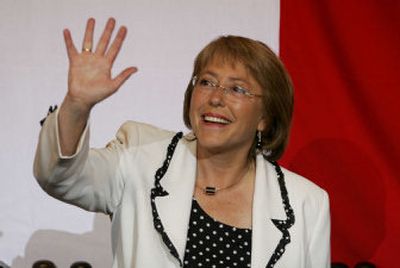Bachelet on verge of Chilean history

SANTIAGO, Chile – She was jailed by Gen. Augusto Pinochet’s junta, then exiled. As a medical student she treated torture victims, and later, as defense minister, she won over the generals. Now Michelle Bachelet is the favorite to become Chile’s first woman president.
As Chileans vote today in their fourth free election since Pinochet stepped down in 1990, the general and his 17-year rule appear irrelevant to today’s prosperous nation of 15.5 million. At age 90, he is under house arrest in his suburban Santiago mansion, indicted on charges of corruption and human rights violations. His loyalists no longer hit the streets in his support when the courts go after him, and his name rarely came up in the election campaign, even though one of the candidates, economist Joaquin Lavin, served in the Pinochet regime.
“Pinochet belongs to the past. He gets more attention abroad than at home,” Bachelet said.
Polls show her the likely winner against a divided right wing, but not with a clear majority, meaning she would face a runoff Jan. 15 against either Lavin or Sebastian Piñera, a Pinochet opponent and multimillionaire businessman who pioneered credit cards in Chile. Leftist engineer Tomas Hirsch, whose coalition includes the Communist Party, lags far behind.
“A runoff election appears inevitable,” but “I do not see Bachelet’s victory in danger,” political scientist Ricardo Israel told the Associated Press, voicing a consensus among Chilean analysts. An opinion poll by the independent Center for Studies of Contemporary Reality, published Thursday, didn’t change much from previous soundings, giving Bachelet 41 percent, Piñera 25, Lavin 21 and Hirsch 7. It gave a margin of error of 2.84 percentage points.
Bachelet would be Latin America’s fourth elected female leader, representing the popular center-left coalition in power since 1990. President Ricardo Lagos, who is constitutionally limited to one term, enjoys nearly 65 percent support in the polls, and few Chileans seem in any mood for radical changes.
Still, Bachelet promises half her cabinet would be female, and she suggests Chile could benefit from a leader who knows firsthand what it’s like to raise children, do the shopping and resolve disputes.
The 54-year-old candidate’s personal history is an important part of her public image; her father, a general, was tortured to death for opposing Pinochet’s 1973 coup. She herself was forced into exile after being jailed with her mother, blindfolded, beaten and denied food for five days while their cellmates were raped. And as a medical student, her aides say, she often treated women who were tortured.
Bachelet has three children with two men, the first of whom she married while in exile in East Germany. Divorce is a touchy issue in Catholic Chile, and Bachelet refuses to discuss her marital status, saying it’s a private matter.
She became a pediatrician and moved up in the Socialist Party. As Lagos’ defense minister, she won over some of her father’s former antagonists, and has worked to reduce the mistrust between civilians and the military.
Like Lagos, Bachelet has said she will leave it to the courts to deal with Pinochet and other unresolved human rights issues, a position the military has accepted.
Pinochet’s few remaining loyalists complain that he is isolated and forgotten. For his 90th birthday on Nov. 26, some 100 people gathered at his house to greet him, but he did not appear. His spokesman, Gen. (Ret.) Guillermo Garin, said “it’s sad to see a man to whom Chile owes so much virtually abandoned by everybody.”
Both Lagos and Bachelet belong to the same Socialist Party of Salvador Allende, the Marxist president toppled by Pinochet. But the post-Pinochet Socialists have embraced free-market economics to radically cut inflation and poverty levels, boost foreign trade and foster growth of about 6 percent a year.
All three main candidates stress the same issues – fighting an unemployment rate of 8 percent, improving public health services and further narrowing the gap between rich and poor.
After bringing the candidates before an audience of leading businessmen, organizer Alfredo Moreno said any fears for Chile’s post-election economy “have disappeared.”